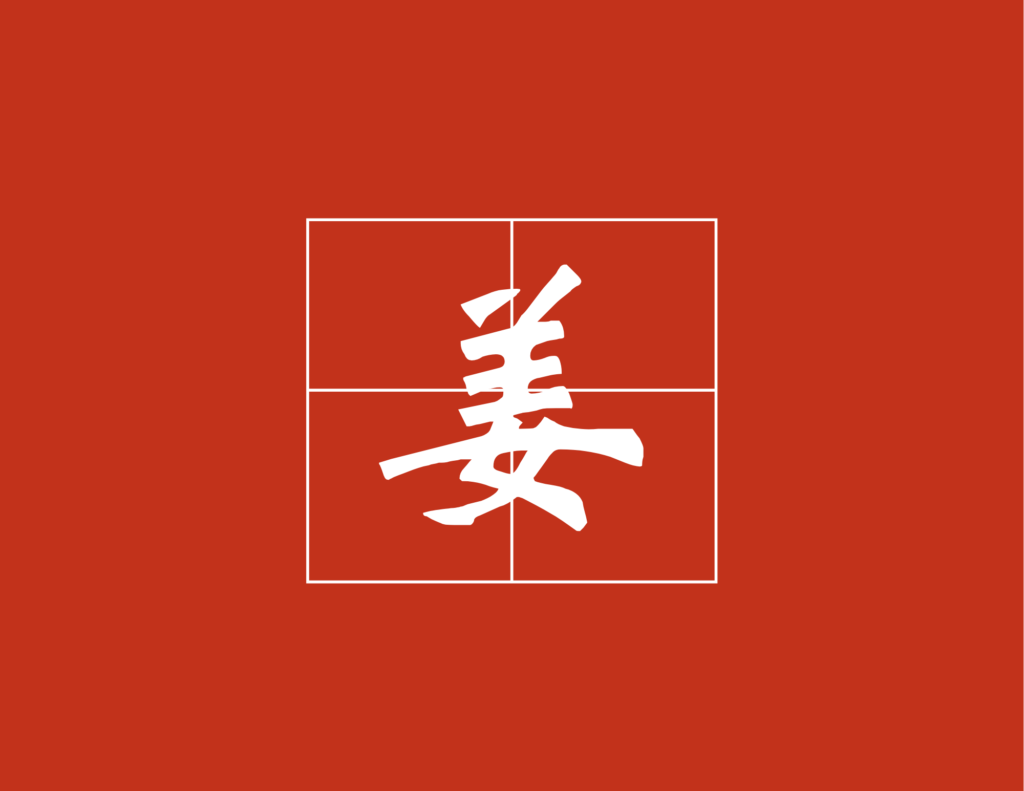1. Character Origins: From Spice to Sovereignty
At first glance, the character 姜 evokes something familiar in every Chinese kitchen: ginger, the pungent root that invigorates both the palate and the body. But in the context of Chinese surnames, 姜 carries far more than culinary meaning—it holds a symbolic resonance of vitality, continuity, and resilience.
Early inscriptions in oracle bone and bronze script reveal that “姜” was not merely descriptive, but deeply emblematic of tribal lineage and matriarchal leadership. Its pictographic roots suggest a connection to early clan structures where women played central, often leading roles. Thus, long before the character was confined to recipe books, it was already etched into the genealogical spine of Chinese civilization.
Symbolically, ginger’s properties—its warmth, ability to stimulate, and subtle potency—resonate with the values the Jiang lineage has upheld for millennia: quiet power, moral grounding, and inner strength.
2. Surname Origins: Royal Bloodlines and Clan Power
The Jiang surname boasts one of the most ancient and noble origins in Chinese history. It is traditionally regarded as a descendant branch of the Yan Emperor (炎帝)—a legendary tribal leader seen as a progenitor of Chinese civilization.
As the Zhou dynasty emerged, the Jiang clan stepped forward to shape history. Jiang Ziya (姜子牙), also known as Jiang Taigong, was not just a political figure but a cultural archetype: the wise, patient adviser whose counsel enabled the rise of the Zhou and the fall of the corrupt Shang dynasty.
Under his guidance, the Jiang surname was enshrined in the State of Qi (齐国)—a powerful feudal kingdom whose influence persisted for centuries. This origin story imbued the Jiang name with a sense of legitimacy, longevity, and governance—marking it not merely as a family name, but as a pillar in the construction of early Chinese political order.
Over time, the Jiang surname took root particularly in Shandong, Henan, and Hebei, branching out across regions while retaining its elite heritage.
3. Matriarchal Echoes: A Rare Cultural Memory
Unlike many ancient Chinese surnames that reflect patrilineal systems, Jiang offers a rare and fascinating glimpse into a possible matriarchal past. Anthropologists and historians suggest that the Jiang lineage may have originated from female-led tribal societies—an unusual trait in early Chinese recorded history.
This matriarchal legacy doesn’t only exist in dusty academic papers. It pulses through folk tales, ancestral rituals, and regional customs. In parts of Shandong, ancestral halls for Jiang clans often give reverence to both male and female forebears—an intentional balance that signals respect for early gender parity.
In a world that often obscured or diminished the roles of women in historical records, the Jiang surname becomes a vessel to discuss gender, leadership, and the evolution of family structures in East Asia.
4. Cultural Values: Wisdom, Restraint, and Strategic Thinking
Throughout Chinese history, surnames are not just labels—they are moral legacies, passed through generations like heirlooms. Jiang is no exception.
Whether in historical texts, philosophical references, or Confucian discourse, the Jiang surname has long been associated with moral restraint, foresight, and a capacity for strategic patience. These were not abstract ideals—they were lived realities for Jiang ancestors, particularly in the volatile political climate of early dynasties.
Confucian ethics praise individuals who act with integrity but without arrogance, who endure chaos with poise, and who lead not through noise, but through quiet vision. The Jiang legacy aligns seamlessly with this philosophy, making the name both respected and culturally resonant in scholarly circles.
5. Historical Figure: Jiang Ziya (姜子牙), The Fisherman Sage
No discussion of the Jiang surname is complete without honoring Jiang Ziya, a man whose legacy is as mythic as it is historical.
Often depicted sitting patiently by a riverbank with a straight fishhook, Jiang Ziya embodied the virtue of waiting for destiny—a metaphor for readiness and self-assured timing. His counsel led to the founding of the Zhou dynasty, and his descendants were enfeoffed with the State of Qi, one of the strongest vassal states during the Spring and Autumn period.
His image—a strategist, philosopher, and loyal servant to justice—has come to symbolize the ideal political advisor in Chinese history. He is not simply remembered; he is emulated, invoked in poetry, honored in temples, and studied by statesmen.
Through him, the Jiang name is etched into the very concept of Chinese political wisdom.
Conclusion: A Surname That Holds Time
In the Jiang surname, we find the threads of ancestral authority, matriarchal memory, political cunning, and cultural endurance. It is not merely a name on a scroll or a tombstone, but a living expression of what it means to lead with strength, to persist with humility, and to act with purpose.
For those who carry this name today—whether they know it or not—they inherit not only a bloodline, but a heritage of quiet leadership, historic resilience, and profound wisdom.
